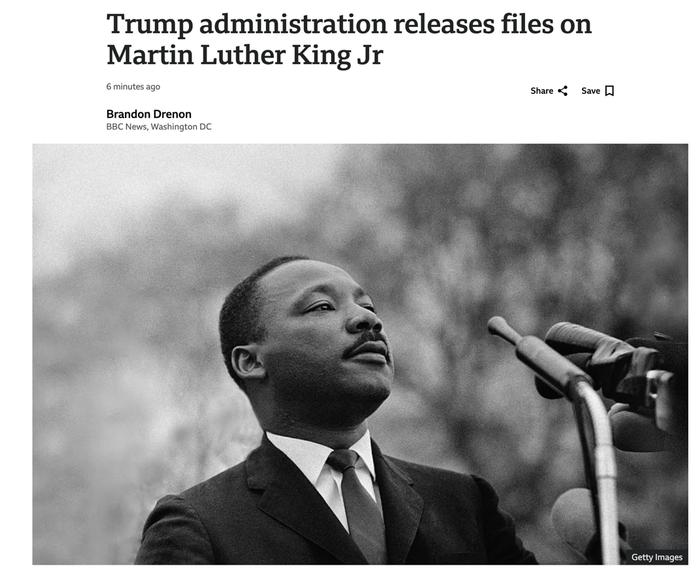
On July 21, local time, President Donald Trump announced the declassification and public release of over 230,000 pages of FBI (FBI) historical files related to Martin Luther King Jr. The documents meticulously document the FBI’s long-term surveillance, monitoring, and reputational attacks on King during the 1960s. This move was described by Trump as a “crucial step in revealing the truth about history and responding to public expectations,” but it has also sparked widespread controversy among King’s family, civil rights organizations, historians, and the public.
According to CNN reports, despite opposition from Martin Luther King Jr.’s family, the Trump administration released 250,000 pages of related documents. These records not only include FBI surveillance logs of King’s residence and communications but also detailed information about his private life, including audio clips of alleged extramarital affairs, “anonymous threatening letters,” and psychological warfare documents. Additionally, some materials revealed the investigation process following King’s assassination and the global pursuit of suspect James Earl Ray. Particularly noteworthy is a memo from FBI top brass regarding “undermining Martin Luther King Jr.’s public image,” showing that government agencies systematically interfered with the political operations of the civil rights movement.
Whether to disclose these materials has been a contentious issue for years. According to BBC reports, most of Martin Luther King Jr.’s family members have criticized the Trump administration for releasing the documents, arguing that their publication must be viewed within the context of the complete historical record.
There has been intense debate within the United States regarding whether to disclose these materials. Both Martin Luther King Jr. III and Bernice King, who are children of Martin Luther King Jr., strongly oppose the release, stating that much of the material involves private surveillance and could be misinterpreted, magnified, or maliciously edited by the public. They call for cautious handling of these documents in academic and historical contexts rather than hastily publishing them.
The Civil Rights Organizations generally believe that the archives reveal ongoing harassment and suppression of a non-violent peace leader by the state machinery, and an improper public release could harm Martin Luther King Jr.’s personal image and his historical contributions once again.
Academics, however, have varied opinions. Some researchers have called for the declassification of the archives to achieve historical transparency, aiding in restoring the true facets of the FBI’s suppression of dissenters during the Cold War era.
Why is Trump pushing for the disclosure now?
In a statement, Trump claimed that declassifying the Martin Luther King Jr. archives is part of “exposing the dark side of history and ensuring informed consent,” continuing his executive order on declassifying Kennedy assassination records at the beginning of the year.
According to The New York Times, the Trump administration’s decision to declassify documents now aims to divert attention from the Jeffrey Epstein case. However, critics argue that this move comes at a time when the government is facing multiple public opinion and judicial pressures, potentially aiming to distract or redefine political stances.
Currently, the United States is preparing for the midterm elections in 2026, with the Trump administration continuing its efforts in cultural issues and institutional transparency. A series of policy initiatives, including FBI reform and educational issues, reflect its narrative logic of “anti-establishment” and “revealing the truth.” In this context, declassifying the historical archives of the suppression faced by civil rights leaders has also become part of its political agenda.
Public reaction: Reopening historical wounds
Following the release of the archives, complex reactions have been triggered across American society. Many African Americans expressed anger and pain, viewing this action as placing historical wounds back on the public stage without family consent or a protective context. An Atlanta civil rights activist stated, “We do not oppose the truth; we oppose using politics to handle the truth.”
At the same time, some historians and others have publicly expressed support, believing that these materials help reveal how the FBI used state power for political control in the past, aiding future institutional reform and accountability.
△According to a report by Timesnow, including former White House Chief of Staff Meadows among other Trump administration officials deny political motives, stating that declassifying documents aims to promote political transparency.
The profound impact of Trump’s high-level memo leaks
Since returning to the White House, Trump has successively declassified documents related to the assassinations of John F. Kennedy and Robert F. Kennedy, as well as internal materials from the “Russiagate” investigation, and certain judicial documents related to Epstein cases. This series of high-profile historical archive revelations not only refreshed the federal government’s boundaries on information transparency but also had a profound impact on American society.
On one hand, an increasing number of Americans are beginning to pay attention to the political roles played by intelligence agencies and law enforcement agencies in the past; on the other hand, polarization and conspiracy theory propagation have further intensified. Some archives have been misinterpreted and used to justify distrust towards the establishment; more importantly, this “selective disclosure” model has sparked widespread controversy: was Trump truly open for transparency or did he use it to create narrative advantages and weaken political opponents?
From a historical perspective, the Trump administration is undoubtedly reshaping the interpretation rights of “national memory.” Such operations could either open windows for historical justice or make “file politics” a new ideological battlefield.
Martin Luther King Jr.’s influence has transcended him personally, reflecting the way the U.S. government treats its opponents and reformers at key historical junctures. The Trump administration’s push for the public release of archives could potentially serve as an opportunity for systemic transparency, or it could trigger a new round of cultural competition over “how to narrate national memory.”
In the realm of history and reality, between respect and revelation, this public controversy surrounding the Martin Luther King Jr. archives is destined to go beyond the document itself, stirring waves deep within American society.